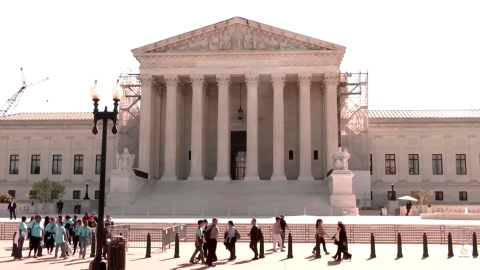


In a hotly contested 6-3 decision Friday, the Supreme Court limited the power of district courts, dodged the issue of birthright citizenship, and delayed renewal of Pres. Trump’s executive order on the subject for a month.
Friday’s ruling "puts an end to the 'increasingly common' practice of federal courts issuing universal injunctions," Justice Clarence Thomas declared in a concurring opinion.
In its Trump v. CASA decision, the Court responded to an emergency appeal by the Trump Administration by granting a partial stay of a district court’s issuance of a universal (nationwide) injunction against Trump’s executive order, which extended the ruling’s effect beyond the court’s designated jurisdiction.
In three separate lawsuits (one each filed by individuals, organizations and states), decisions enjoined the nationwide implementation and enforcement of President Trump’s Executive Order No. 14160, which states that citizenship is not conferred simply because a person is born on U.S. soil.
The Court’s decision grants the Trump Administration’s applications to partially stay the district court's nationwide injunctions in the birthright citizenship case, because universal injunctions "likely exceed the equitable authority that Congress has granted to federal courts.”
Lower courts should limit their rulings to providing relief to only the plaintiffs of the particular lawsuits, not extend them to the nation in order to usurp the executive authority of a president, Justice Amy Coney Barrett writes in the majority opinion:
"[P]rohibiting enforcement of the Executive Order against the child of an individual pregnant plaintiff will give that plaintiff complete relief. Her child will not be denied citizenship. Extending the injunction to cover all other similarly situated individuals would not render her relief any more complete."
…
"Federal courts do not exercise general oversight of the Executive Branch; they resolve cases and controversies consistent with the authority Congress has given them. When a court concludes that the Executive Branch has acted unlawfully, the answer is not for the court to exceed its power, too."
But, the Trump Administration’s applications to partially stay the district court's preliminary injunctions "are granted, but only to the extent that the injunctions are broader than necessary to provide complete relief with respect to each plaintiff with standing to sue."
The Court instructs the district courts to "move expeditiously to ensure that, with respect to each plaintiff, the injunctions comport with this rule and otherwise comply with principles of equity."
However, the Court says that it is not deciding whether Trump’s executive order is constitutional, but only if district courts can issue nationwide injunctions against it.
The constitutionality issue is a separate one and must be litigated as such, though the Supreme Court may address that question if it works its way up through the appellate system, the decision says.
Despite deciding that lower courts can’t issue nationwide injunctions against the president’s order, the Supreme Court ruled that Trump’s execute order won’t go back into effect for another 30 days – inviting a flurry of class action lawsuits against the order over the next month.
Thursday’s ruling fails to resolve two issues that "potentially threaten the practical significance of today's decision: the availability of third-party standing and class certification," Associate Justice Samuel Alito warns in his concurring statement.
The Supreme Court decision "does not address the weighty issue of whether the state plaintiffs have third-party standing to assert the Citizenship Clause claims of their individual residents," Justice Alito writes.
